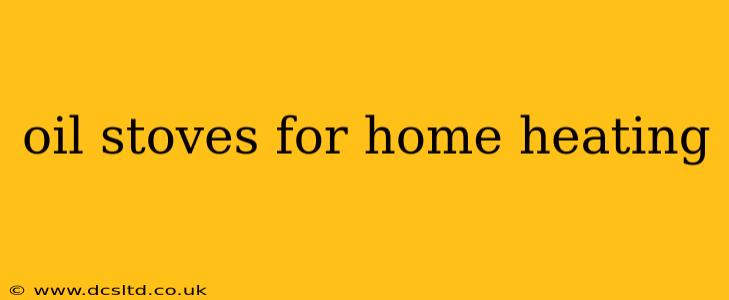Oil stoves, once a staple in many homes, are experiencing a resurgence in popularity due to rising energy costs and concerns about reliance on the power grid. While not as common as central heating systems or even electric heaters, oil stoves offer a distinct set of advantages and disadvantages that potential buyers should carefully consider. This comprehensive guide will explore the various aspects of using oil stoves for home heating, answering your key questions and helping you make an informed decision.
What are the different types of oil stoves?
Several types of oil stoves cater to various heating needs and preferences. These include:
- Kerosene Heaters: These are the most common type, utilizing kerosene as fuel. They range from simple wick-style stoves to more advanced models with electronic ignition and safety features. Kerosene is relatively readily available and affordable, making these stoves a popular choice.
- Paraffin Heaters: Similar to kerosene heaters, paraffin heaters utilize paraffin wax as fuel. They often boast a cleaner burn and longer burn times compared to kerosene heaters, but paraffin fuel might be slightly more expensive or less widely available depending on your location.
- Fuel Oil Heaters: These stoves utilize heavier fuel oils, often requiring larger tanks and more robust construction. They are typically more powerful than kerosene or paraffin heaters, making them suitable for larger spaces. However, they may also require more maintenance and present greater safety concerns if not handled properly.
Are oil stoves safe for indoor use?
Oil stoves, when used correctly and maintained regularly, can be safe for indoor use. However, safety is paramount, and several precautions are necessary:
- Proper Ventilation: Oil stoves produce combustion byproducts, including carbon monoxide. Adequate ventilation is crucial to prevent carbon monoxide buildup, which can be fatal. Always ensure your stove is placed in a well-ventilated area, ideally with a carbon monoxide detector nearby.
- Fuel Storage: Store fuel in a designated, well-ventilated area away from ignition sources and out of reach of children.
- Regular Maintenance: Regular cleaning and maintenance of the stove and fuel lines are essential to prevent malfunctions and ensure optimal performance. Follow the manufacturer's instructions carefully.
- Child Safety: Keep oil stoves away from children and pets. Never leave a burning stove unattended.
How efficient are oil stoves compared to other heating options?
The efficiency of oil stoves varies depending on the model and its condition. Modern models are generally more efficient than older ones, but they are not as efficient as some modern heat pumps or high-efficiency natural gas furnaces. Their efficiency is also dependent on factors such as proper ventilation and regular maintenance. Compare the BTU output and efficiency ratings of different models before purchasing.
What is the cost of running an oil stove?
The cost of running an oil stove depends on several factors, including the price of fuel, the size of the stove, the efficiency of the stove, and the length of the heating season. Kerosene is generally less expensive than paraffin, and prices can fluctuate depending on market conditions and your location. It's wise to estimate your fuel consumption based on the stove's BTU rating and the size of the area you need to heat.
How much does an oil stove cost to buy?
The purchase price of an oil stove varies significantly based on the type, size, features, and brand. Simple wick-style kerosene heaters can be relatively inexpensive, while advanced models with features such as electronic ignition and thermostats are more costly. Fuel oil heaters are generally more expensive due to their larger size and more complex construction.
How do I choose the right size oil stove for my home?
Choosing the right size oil stove involves considering the size of the space you need to heat. Manufacturers usually specify the BTU output of their stoves, which indicates the heating capacity. You should consult a BTU calculator or consult with a heating professional to determine the appropriate BTU output for your needs. Oversized stoves can be inefficient and potentially dangerous, while undersized stoves might struggle to adequately heat your space.
Remember, this information is for general guidance only. Always consult the manufacturer's instructions and consider seeking professional advice before installing and using any oil stove. Safety should be your top priority when using any fuel-burning appliance in your home.
